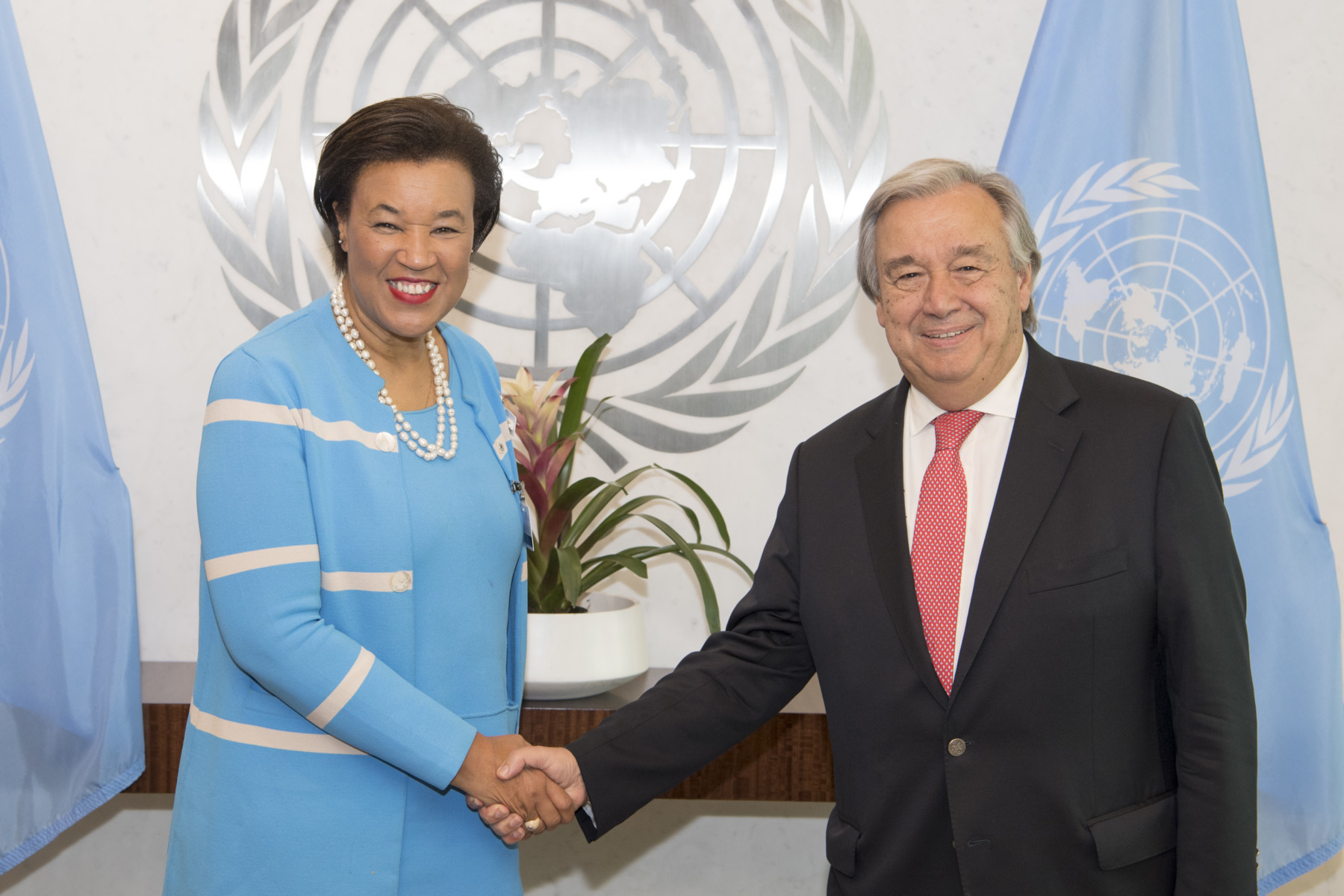António Guterres of Portugal took office on 1 January 2017 as the ninth Secretary-General of the United Nations. Formerly the UN High Commissioner for Refugees, he was Prime Minister of Portugal from 1995 to 2002. In a September 2017 interview, he talked about the 2030 Agenda – the Sustainable Development Goals (SDGs) that all Member States, including Commonwealth countries, agreed as the pathway to global development.
In his interview, Mr Guterres said it was important that globalisation does not leave anyone behind. We need an inclusive and sustainable world so that our children and grandchildren benefit from what we are achieving today.
The Commonwealth shares Mr Guterres’ vision. In fact we have much in common, having collaborated on many projects in recent years. And, of course all Commonwealth states are working towards achieving the UN’s SDGs.
So it was natural for our Secretary-General Patricia Scotland to meet the UN Secretary-General António Guterres to discuss ways the two organisations can work even more closely,
The meeting in September 2017 took place at a critical stage in international relations, with many countries facing unprecedented challenges and existential threats.
The two Secretaries-General met on the margins of the 72nd Session of the General Assembly in New York. Their discussion focused on outcomes, and they underscored shared values and goals in meeting global challenges.
As Commonwealth countries in Africa, Asia and the Pacific, and the Caribbean respond to crises, the two leaders pledged to tackle present and future challenges together, in areas including disaster response, climate change, conflict prevention and the empowerment of women.
The Commonwealth played a very important role… in making the Paris Agreement possible. The clear messages from the meeting of the heads of government from the Commonwealth just before the Paris conference was a very important impulse”.
— Patricia Espinosa, Executive Secretary of the United Nations Framework Convention on Climate Change
Working with the UN in 2015-2017
2016/17
- We collaborated with UN Women to develop a judicial bench book on violence against women and girls (VAWG) for Asia. The book will help strengthen the judiciary in the region to effectively address the issue.
- The United Nations Development Programme recognised our Youth Development Index (YDI) report, and asked if they could feature it in the next Human Development Index and Report.
- The Commonwealth supported the Seychelles in developing its marine boundary through a submission to the UN for joint management with Mauritius of the extended continental shelf in the Mascarene Plateau Region.
- The Kigali Declaration on child, early and forced marriage (CEFM) – now signed by 20 members – gained traction at a successful Commonwealth side-event at the UN Human Rights Council (Geneva, June 2017). The Commonwealth and the UN’s Office of the High Commissioner for Human Rights jointly hosted the event.
- We continued to support and advise member countries on their UN Universal Periodic Review processes, including Samoa, Antigua and Barbuda, Papua New Guinea, Saint Vincent and the Grenadines, Swazilandand Tanzania.
- The UN Conference on Trade and Development (UNCTAD) recognised our lead role in garnering momentum to secure a new WTO agreement on addressing harmful fisheries subsidies. We issued a joint statement on the Regulation of Fisheries, signed by more than 90 countries (July, 2016). This statement was a key step towards addressing Goal 14.6 of Sustainable Development Goal 14 on addressing harmful fishing subsidies.
- We developed a pilot project to effectively address and identify harmful fishing subsidies with the United Nations Conference on Trade and Development (UNCTAD)the Organisation for Economic Cooperation and Development (OECD) andthe Organisation for Economic Cooperation and Development (OECD) and the Organisation for Economic Cooperation and Development (OECD).
- The Commonwealth collaborated with the UN Committee for Development Policy (UNCDP) and the UN Department of Economic and Social Affairs (UNDESA). Our aim was to develop an effective framework for Least Developed Countries to graduate from LDC status, including contributing to a new online platform to enable countries to estimate potential graduation costs.
- The UN’s 2017 Financing for Development Review highlighted and referenced our work on the International Monetary Fund’s reform of its Low Income Country Debt Sustainability Framework. The reform called for greater balance from the IMF in assessing low-income country debt sustainability issues.
2015/16
- The Commonwealth worked with United Nations (UN) agencies to verify information provided to the Commonwealth Ministerial Action Group.
- We collaborated closely with the United Nations Development Programme (UNDP) in building tailored good offices strategies for Lesotho and with the UN in relation to the Maldives.
- Our election-observer missions cooperated and collaborated with the UN and UNDP.
- When we needed access to relevant technical expertise for the CAACC’s training programmes, and conducting anti-corruption related research in Commonwealth Africa, we worked with the UNODC and UNDP.
- Together with UNCTAD, International Labour Organization (ILO) and NGOs, we supported eight Eastern and Southern Africa countries in policy and institutional reform reviews to bolster youth entrepreneurship. This support followed a regional workshop for senior officials from Youth, Labour and Trade ministries, and young entrepreneurs.
- The Commonwealth worked with UNDP, UNDESA and UNESCO to agree on the methodology and data for the 2016 Global Youth Development Index (YDI). This expertise has made the YDI a more robust tool.
- Partnership has been key to our youth entrepreneurship work, including the development with UNCTAD of a Policy Guide for Youth Entrepreneurship (used by eight members in Eastern and Southern Africa) and a capacity building workshop for senior government officials.
Improving how we operate
Creating our Commonwealth Hub
Teaming up with Malta

